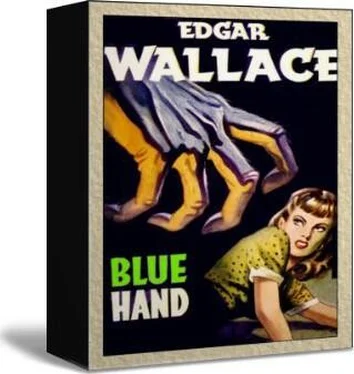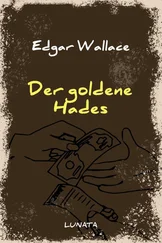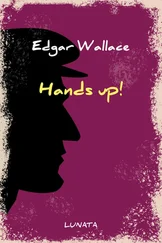Edgar Wallace - Blue Hand
Здесь есть возможность читать онлайн «Edgar Wallace - Blue Hand» весь текст электронной книги совершенно бесплатно (целиком полную версию без сокращений). В некоторых случаях можно слушать аудио, скачать через торрент в формате fb2 и присутствует краткое содержание. Год выпуска: 0101, Жанр: Старинная литература, на английском языке. Описание произведения, (предисловие) а так же отзывы посетителей доступны на портале библиотеки ЛибКат.
- Название:Blue Hand
- Автор:
- Жанр:
- Год:0101
- ISBN:нет данных
- Рейтинг книги:3 / 5. Голосов: 1
-
Избранное:Добавить в избранное
- Отзывы:
-
Ваша оценка:
- 60
- 1
- 2
- 3
- 4
- 5
Blue Hand: краткое содержание, описание и аннотация
Предлагаем к чтению аннотацию, описание, краткое содержание или предисловие (зависит от того, что написал сам автор книги «Blue Hand»). Если вы не нашли необходимую информацию о книге — напишите в комментариях, мы постараемся отыскать её.
Blue Hand — читать онлайн бесплатно полную книгу (весь текст) целиком
Ниже представлен текст книги, разбитый по страницам. Система сохранения места последней прочитанной страницы, позволяет с удобством читать онлайн бесплатно книгу «Blue Hand», без необходимости каждый раз заново искать на чём Вы остановились. Поставьте закладку, и сможете в любой момент перейти на страницу, на которой закончили чтение.
Интервал:
Закладка:
“It will never change,” she said as she rose. “But I see that I am wasting my time with you,” and with a little nod, she would have gone had he not caught her hand and drawn her back.
“You love somebody else, I suppose?”
“That is an impertinence,” she said. “You have no right to question me.”
“I am not questioning you, I am merely making a statement which is beyond dispute. You love somebody else, and that somebody is Jim Steele.” He leant forward. “You can make up your mind for this, that sooner than give you to Jim Steele, I will kill you. Is that plain?”
“It is the kindest thing you have said,” she smiled contemptuously as she rose.
CHAPTER FORTY-NINE
A LITTLE smudge of smoke far away to the south, sent Jim Steele racing away on a fool’s errand, for the ship proved to be nothing more interesting than a fruit-boat which had ignored his wireless inquiry because the only man who operated the instrument was asleep in his bunk. Jim saw the character of the ship when he was within two miles of it, and banked over, cutting a diagonal course north-west.
Once or twice he glanced back at his “passenger,” but Inspector Maynard was thoroughly at home and apparently comfortable.
Jim was growing anxious. At the longest he could not keep in the air for more than four hours, and two of those precious hours were already gone. He must leave himself sufficient “juice” to make the land and this new zigzag must not occupy more than half an hour.
He had purposely taken the machine to a great height to enlarge his field of vision, and that meant a still further burden upon his limited supply of petrol.
He was almost despairing when he saw in the far distance a tiny white arrow of foam—the ship whose wake it was he could not see. His hand strayed to the key of his little wireless and he sent a message quivering through the ether. There was no response. He waited a minute and again the key clattered and clicked. Again a silence and he flashed an angry message. Then through his ear-pieces he heard a shrill wail of sound—the steamer was responding.
“What ship is that?”
He waited, never doubting that he would learn it was some small merchant vessel. There was a whine, and then:
“P-E-A-L-I-G-O,” was the reply.
Digby had gone forward to see what the men were doing who were swung over the side. He was delighted to discover that they were painting out the word Pealigo and were substituting Malaga. He went up to the captain in his most amiable mood.
“That is a good thought of yours,” he said, “changing the name, I mean.”
The captain nodded.
“By your orders, of course,” he said.
“Of course,” smiled Digby, “by my orders.”
All the time he was standing there chatting to the Brazilian he noticed that the man constantly turned his eyes to the north, scanning the sky.
“You don’t think that the aeroplane will come so far out, do you? How far are we from the coast?”
“We are a hundred and twelve miles from the English coast,” said the skipper, “and that isn’t any great distance for a seaplane.”
Digby with unusual joviality slapped him on the back.
“You are getting nervous,” he said. “He won’t come now.”
A man had come on to the bridge whom Digby recognized as the wireless operator. He handed a message to the captain, and he saw the captain’s face change.
“What is it?” he asked quickly.
Without a word the man handed the written slip.
“Ship heading south, send me your name and number.”
“Who is it from?” asked Digby, startled at this voice from nowhere.
The captain, supporting his telescope against a stanchion, scanned the northern skies.
“I see nothing,” he said with a frown. “Possibly it came from one of the land stations; there is no ship in sight.”
“Let us ask him who he is,” said Digby.
The three went back to the wireless room and the operator adjusted his ear-pieces. Presently he began writing, after a glance up at the captain, and Digby watched fascinated the movements of the pencil.
“Heave to. I am coming aboard you.”
The captain went out on the deck and again made a careful examination of the sky.
“I can’t understand it,” he said.
“The signal was close, senhor captain—it was less than three miles away,” broke in the operator.
The captain rubbed his nose.
“I had better stop,” he said.
“You’ll do nothing of the kind,” stormed Digby.
“You’ll go on until I tell you to stop.”
They returned to the bridge, and the captain stood with one hand on the telegraph, undecided.
And then right ahead of them, less than half a mile away, something fell into the water with a splash.
“What was that?” said Digby.
He was answered immediately. From the place where the splashing had occurred arose a great mass of billowing smoke which sped along the sea, presenting an impenetrable veil. Smoke was rising from the sea to their right, and the captain, shading his eyes, looked up. Directly over them it seemed was a silvery shape, so small as to be almost invisible if the sun had not caught the wing-tips and painted them silver.
“This, my friend,” said the captain, “is where many things happen.” He jerked over the telegraph to stop.
“What is it?” asked Digby.
“It was a smoke-bomb, and I prefer a smoke-bomb half a mile away to a real bomb on my beautiful ship,” said the captain.
For a moment Digby stared at him, and then with a scream of rage he sprang at the telegraph and thrust it over to full-ahead. Immediately he was seized from behind by two sailors, and the captain brought the telegraph back to its original position.
“You will signal to the senhor aviator, to whom you have already told the name of the ship, if you have obeyed my orders,” he said to the operator, “and say that I have put Mr. Digby Groat in irons!”
And five minutes later this statement was nearly true.
Down from the blue dropped that silvery dragon-fly, first sweeping round the stationary vessel in great circles until it settled like a bird upon the water close to the yacht’s side.
The captain had already lowered a boat, and whilst they were fixing the shackles on a man who was behaving like a raving madman in his cabin below, Jim Steele came lightly up the side of the ship and followed the captain down the companion-way.
Above the rumble of the yacht’s machinery Eunice had heard the faint buzz of the descending seaplane, but had been unable to distinguish it until the yacht stopped, then she heard it plainly enough and ran to the porthole, pulling aside the silk curtain.
Yes, there it was, a buzzing insect of a thing, that presently passed out of sight on the other side. What did it mean? What did it mean, she wondered. Was it—and then the door flew open and a man stood there. He was without collar or waistcoat, his hair was rumpled, his face bleeding, and one link of a steel handcuff was fastened about his wrist. It was Digby Groat, and his face was the face of a devil.
She shrank back against the bed as he came stealthily toward her, the light of madness in his eyes, and then somebody else came in, and he swung round to meet the cold level scrutiny of Jim Steele.
With a yell like a wild beast, Digby sprang at the man he hated, but the whirling steel of the manacle upon his hand never struck home. Twice Jim hit him, and he fell an inert heap on the ground. In another second Eunice was in her lover’s arms, sobbing her joy upon the breast of his leather jacket.
THE END
Интервал:
Закладка:
Похожие книги на «Blue Hand»
Представляем Вашему вниманию похожие книги на «Blue Hand» списком для выбора. Мы отобрали схожую по названию и смыслу литературу в надежде предоставить читателям больше вариантов отыскать новые, интересные, ещё непрочитанные произведения.
Обсуждение, отзывы о книге «Blue Hand» и просто собственные мнения читателей. Оставьте ваши комментарии, напишите, что Вы думаете о произведении, его смысле или главных героях. Укажите что конкретно понравилось, а что нет, и почему Вы так считаете.












